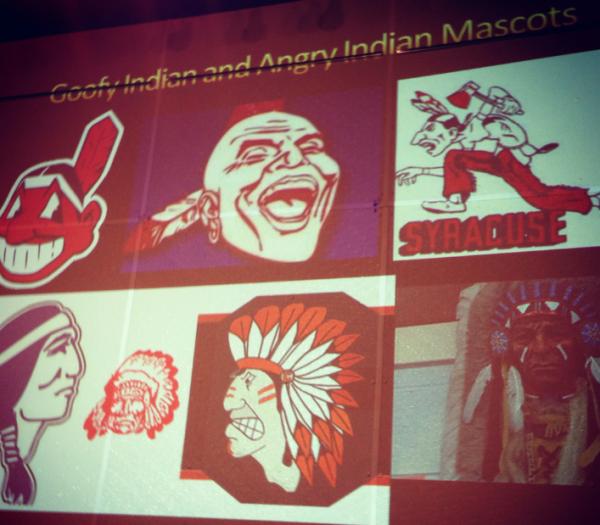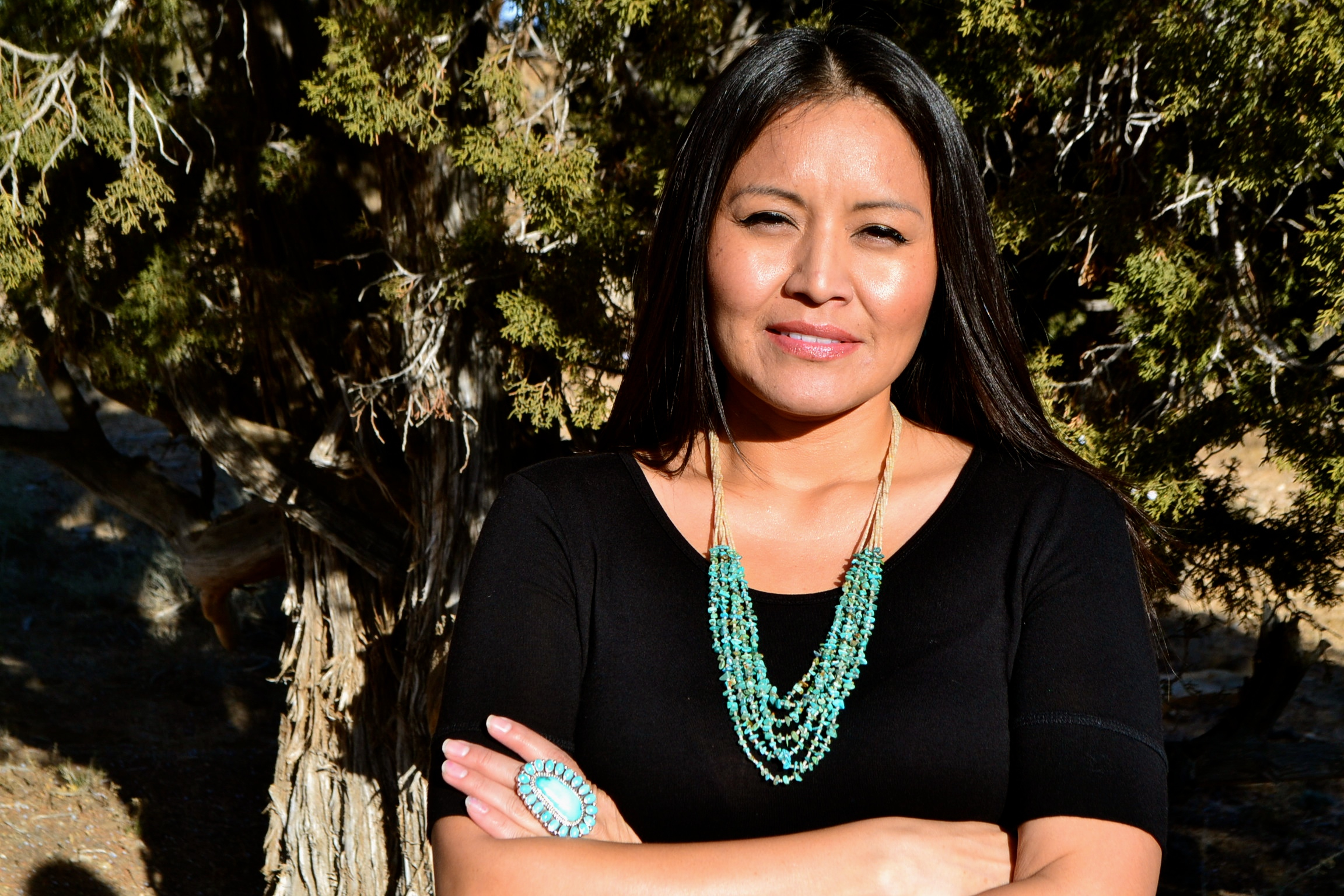Blackhorse: This Is What Dehumanization Looks Like

Quite often when speaking out and educating others about the mascot issue, the same question is asked, “Why are you people worried about mascots? Don't you have bigger issues to worry about on the reservations?”
Native people, likewise, will also ask, “Why are we (indigenous peoples) fighting the mascot issue when there are bigger issues to fight?”
Oh yes, the bigger issues question. What most people seem to be referring to are the many issues which plague Native American communities. Societal problems such as violence against women, suicide, alcoholism, high unemployment rates on reservations, poverty, etc. Many of these issues have been highlighted throughout the history of Native American people, through various studies, articles, documentaries, movies, so on and so on.
I grew up in this ever-so-familiar way of poverty and destruction, in all those ‘bigger issues’ people talk about. My very existence is a symptom of that. I understand it very well; I’ve been accustomed to it, and in many ways it has made me the very resilient person I am today. I understand the struggles of ‘poverty’ and in many ways, I continue to live in that struggle.
So when people tell me we should be worrying about those “bigger issues,” a part of me smiles within, not because it's funny, but because I empathize and further because I know it all too well.
Indeed, these are all very important issues to address and they should be addressed. Many Native American leaders, allies, and the like have worked on addressing these issues and, today, continue to address them. The mascot issue does not take away from the work happening towards making positive change; rather the mascot issue is allowing for those issues to be addressed in an easier way.
If we are not respected as human beings how can we be respected when dealing with politics and/or economics? It makes it harder to be seen as leaders, advocates, and people who want real change to happen in our communities if you are seen as just a person who dances at pow wows and viewed as a mere relic of old cowboy and Indian movies. Of course this is not the case in every situation when dealing with non-Natives and government, but it seems to be a common misconception of Native people, which transcends into politics and government.
Not only are we looked at as just those Indians, but we don’t seem to be heard by the viewer either. Native people have been struggling, advocating, protesting, and trying to invoke change in our communities, but, again, we are not heard!
The mascot issue has been going on for more than 40 years and we are only now beginning to see our people and topics on the national level. Just because it doesn’t make headlines does not mean the battles are not being fought somewhere in Native America. Our voice doesn’t seem to be strong enough, so protest, lawsuits, and movements are necessary so that we can be heard, loud and clear.
By telling Native people they should be worried about more important issues tells Native people their voice and their feelings are not enough or they are unimportant. It tells Native people that the voice of the non-Native is far more important and more powerful than the true voice of the indigenous population.
Native American people have been targeted for their race, their land, and their resources. So when the dominant culture believes they are superior to the indigenous population they will dehumanize and dominate us for their own good. This includes the dehumanization of our entire being, especially our identity.
Dehumanization of indigenous people is:
1. The land grabbing of indigenous lands
2. The raping, violence, and hatred directed at indigenous women and children
3. The poisoning of our water
4. The desecration of our ancestor’s bones and graves
5. Each “redskin” (hair, scalp, nose, ears, genitals, and skin) taken off of an indigenous person
6. Each child taken from the arms of their parents and grandparents for the sake of “killing the Indian and saving the man”
7. Each treaty that was not honored
8. Every acre of land stolen from indigenous people
9. Every law passed since the Doctrine of Discovery for the sake of Manifest Destiny
10. Every religion stuffed down the throats of indigenous men and women for the sake of colonization
11. Each small pox blanket
12. Every head of hair chopped off in boarding schools and residential schools
13. The forced mining, fracking and desecration of indigenous lands yesterday and today
14. The sterilization of Indigenous women by Indian Health Service
15. Each tribe which no longer exists due to the attempted extermination of Indigenous people
16. Each tribal person who was exiled and relocated to urban communities
17. Each person who has been subjected to alcoholism in the name of poor business or poor treaty deals
18. Each Native person who has been experimented on and exploited for their blood, bodies, and DNA
The dehumanization of indigenous people continues today. Each example is how Native Americans, First Nations, and indigenous peoples of this continent have been subjects for acts of genocide. Each example has occurred in some variation in Native American communities and indigenous communities throughout North and South America. If you have no respect for a person's dignity, wellbeing, and physical well-being, you will not have respect for their identity therefore making it easy to mascot them. As long as the populace refuses to see Native people as real, living, breathing and resilient individuals, the easier it becomes to demean, degrade and mascot them. If our very existence or presence has been stripped away it is easier to create a multi-million, if not billion dollar industry off of the very identity of these people for entertainment purposes.
What people don’t realize is there are real Natives out there who have been truly affected and psychologically damaged by sports mascots. There are real children and youth out there who have fought with their blood, sweat and tears to remove these racist mascots and names. Those children are real and are tribal members and citizens of nations. Although you may not see it or have been affected by it doesn’t mean it doesn’t exist. Just because it is out of sight and out of mind doesn’t make it any less real, any less hurtful to those who have been affected by it.
Any attempt to humanize indigenous people is a step in the right direction. Eliminating Native mascots may not be the complete answer, but it is a step in the right direction.
The mascot movement has empowered millions of indigenous peoples around the world because for once we have a voice; for once they can stand at the national level and be proud to be indigenous.
And allow me to drive home this point: using the 'bigger issues' excuse is just that, an excuse. It is an excuse that is counter-productive and does nothing to solve the greater problem of the oppression of Native people and racism directed at Native people. It’s an excuse to be apathetic and to deny a problem really exists. If you are not engaged in addressing those bigger issues you should not be using the bigger issues excuse. If you happen to be working on those bigger issues and still do not agree then let's agree to disagree, and also understand that just because this isn’t your struggle, it doesn’t mean it isn't a struggle for your fellow Native people.
The questions we should be asking ourselves are: “Why have we not achieved true self-determination as indigenous people?" and "Why is it that in this day and age are we still fighting for common decency to be respected by our non-native counterparts?” Those are the real questions.

Amanda Blackhorse, Diné, is a mother and activist. She and four other plaintiffs won a case against the Washington football team that stripped it of six of its seven trademarks. Follow her on Twitter @blackhorse_a. She lives in Kayenta, Arizona on the Navajo Nation.
Read more at http://indiancountrytodaymedianetwork.com/2015/03/20/blackhorse-what-dehumanization-looks-159694